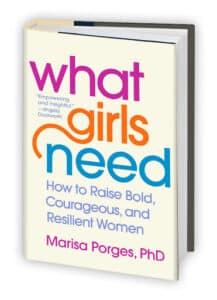On January 20th, the United States inaugurated its first female Vice President. It represented a huge step forward towards gender equality. Of course, it took 225 years to happen. Chances are it won’t take another two centuries to elect the country’s next female vice president or even president. But the unfortunate truth is that there is still a wide gender gap. Women, in fact, still only make 81 cents for every dollar men make, while continuing to face many challenges men simply don’t. This makes preparing the next generation of girls for those hurdles essential, especially if we are to embrace a brighter and more equal future. Marisa Porges, PhD, author of What Girls Need: How to Raise Bold, Courageous, and Resilient Women, recently spoke to WellWell on how to empower and inspire young girls through utilizing their natural advantages so they’ll be prepared to tackle any challenge.
You’ve had this incredible, comic book-esque career starting with becoming a naval pilot before going to Harvard and then earning a doctorate in London and going on to work for the Obama Administration. When you were young, who empowered and inspired you towards that drive and these accomplishments?
First, I really have to thank and commend my parents. The community that they put me in when I was young, The Baldwin School, which happens to be the school I now run, was such a source of empowerment. As a young girl, it allowed me to dream past my limits and helped me develop the skills I would need to face whatever came next. It taught me the resilience I used to face hurdles flying for the navy, as well as the problem solving and collaborative skills I used in the White House. The Baldwin School taught me so much that allowed me to thrive.
You’re currently the head of the Baldwin School, which is a hundred- plus-year-old all-girls school that you attended. How important was it to you to give back to that institution?
It’s always been a community institution that I was very grateful for because of the skills and confidence that it gave me when I was young. I did not ever expect to come back and be the head of the school given my work in national security and other spheres, but when I got the opportunity, I jumped at it.
What’re the unique benefits to attending an all-girls school?
I think it comes down to the particular ways that young girls learn and can be nurtured early on the core skills and confidence of how they use their voice. Speaking up, asking for what they need and ensuring they’re heard. By engaging in teamwork and problem solving and embracing their competitive nature. All of this will greatly help them as adults. In an all-girls environment, these are things at the forefront of how the teachers guide them each day.
Obviously much of What Girls Need is aimed towards shaping this next generation, which is inheriting a slate of issues created from previous generations that they’re now responsible to fix, namely climate change. But I don’t think it’s a coincidence that many of the leaders in the climate change movement today are young women, such as Greta Thunberg or Hannah Testa. What do you think it is about this generation that has produced such empowered and actionable young women?
This generation overall is so connected thanks to social media. The largest problems of the world, like climate change, economic equality, racial inequality, food scarcity issues and animal rights issues are all so front and center for them. So, I think at a younger age, they are aware of it and therefor eager to get involved. I do also think that for young women in particular, the skills of empathy are socialized earlier on, and that empathy then extends to the larger world.
There’s a chapter in What Girls Need that focuses on how to make empathy a young girl’s natural advantage. Why do you think girls naturally have stronger empathy and why is it so crucial for them to utilize it?
Obviously, it’s important to nurture empathy in everyone, both boys and girls. But being able to take somebody else’s perspective, understand that perspective then take that into account when you’re making decisions is a great way of being a human being. Unfortunately, whether it be from societal, cultural or biological reasoning, it comes more naturally to girls. Research shows this, girls tend to display more empathetic tendencies and it’s a distinctive advantage for them, both professionally and personally. Empathy is a superpower for young women.
The flip side of that is boys and men having less empathy and therefore being a lot more comfortable interrupting woman. You mention in the book a study on the Supreme Court that found the female justices get interrupted far more often than their male counterparts by a large margin. How important is it to give young women the tools to hone and defend their voices?
Incredibly important. While we are actively changing the system so those types of things don’t happen, it is going to take a lot of time. And we want to make sure our girls are prepared for the reality that they’ll face. I see every day young girls, teenagers who are not just content having a seat at the table. They’re effectively raising their voice in difficult moments and demanding to be heard. We try and instill this skill and confidence in our girls so when they need it in the real world, they’re ready to go.
In a video for Big Think you note one method to help achieve this is something as simple as allowing your daughter to order the pizza at night to give her the confidence to feel comfortable speaking out. Is this something that parents tend to overlook, something so mundane but could give their child such a powerful feeling of being able to speak up and be listened to?
Yeah, I think it’s definitely something we take for granted. We assume these skills develop naturally over time but in actuality it’s more complicated, especially for girls. The ability to speak up and use your voice effectively, the ability to ask for what you need and negotiate for things in influential ways, the ability to compete in a healthy way that allows for both sides to win and lose, all these things are skills that can be nurtured and practiced over time. It’s more just that we as a society tend to not prioritize it with our girls.
What Girls Needs notes its important for girls to embrace their competitive spirits. Relatedly, we’ve seen a women’s sports leagues have make huge societal impacts this year with the WNBA as a leading force behind flipping the Georgia election and surpassing other leagues with Black Lives Matter support and programs. Yet, they’re rarely mentioned in the larger national discussion of sports overall impact towards those moments in favor of men’s leagues. How do we encourage girls for this knowing it will evidentially be harder for them to get the recognition and respect they earn?
This is where candid conversations with children, boys and girls, can be so powerful. The reality is women across most occupations beyond ones in the spotlight are not getting the credit they deserve. Women to this day still only earn 81 cents for every dollar men earn. The fact of the matter is that there’s going to be more roadblocks and barriers to leadership positions and getting the recognition they deserve for women than there might be for men because of a historically gender bias and discriminatory system. That’s going to take a generation to change so it’s important to be candid about it. To be honest and prepare our girls with the skills to do what they need for themselves and their peers. Help them understand the reality but empower them to thrive despite it.
 About Marisa Porges, PhD
About Marisa Porges, PhD
Dr. Marisa Porges has served at the White House, as White House Fellow and a senior advisor for cybersecurity and technology policy at the National Economic Council. She holds a bachelor’s degree from Harvard University, a master’s degree from the London School of Economics and a doctorate from King’s College London. Dr. Porges also served as a counterterrorism policy advisor in the U.S. Departments of the Treasury and Defense, and on active duty in the U.S. Navy, flying jets as a Naval Flight Officer. Her awards include the National Committee on American Foreign Policy 21st Century Leader Award and the NATO Medal for service in Afghanistan. She is widely published, including by The New York Times, The New Yorker, The Wall Street Journal, and other top-tier outlets. Additionally, she has appeared on CNN, CSPAN, Al Jazeera and more.
Learn more at marisaporges.com













